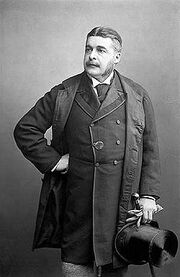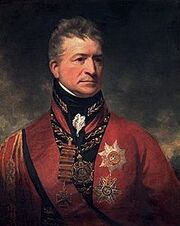
Kaiser Franz (by Konrad Kröger, 1836)
Succession Crisis in Austria[]
Following the dramatic events of 1835, Europe was waiting for the next "old-timer" leader to pass away. Franz of Austria was in terrible health at age 67 and was expected to die any time. King Friedrich Wilhelm III of Prussia had suffered a fall from his horse in 1834, and had been in declining condition since, even though he was only 65. His Wettin wife Maria of Saxony was only 53, but suffering hugely from the effects of increasing obesity. Many leaders of the "Napoleonic Generation" were in bad health. It was no surprise when the harsh winter and following spring of 1835-36 finally brought the Grim Reaper to the Royal Houses of Europe.

Frederick VI of the Kingdom of Denmark-Norway (January 28th, 1768 - November 4th, 1835)
King Frederick VI of Denmark-Norway and the House of Oldenburg was to go down in history as a good monarch. He had been on the winning side of the Great Wars of the Empire, supporting Caesar Napoleon I, despite the fact that he was King George III's nephew. He was actually in good health until the day he died, age 67, in Copenhagen, cause unknown (though he had been complaining of chest pains). His death didn't cause a news storm like Napoleon I's, but his funeral was attended by a large amount of Europe's leaders. The childless king's throne passed to his cousin, Christian Frederik, who became King Christian VIII.

King Christian VIII of Denmark-Norway

Joseph I of the Kingdom of Ireland (January 7th, 1768 - January 9th, 1836)
Joseph Bonaparte was a man who would go down as having ridden his entire life on his younger brother's coattails. Without Napoleon, he would have been nothing. Instead, at his death he had been king of two different nations, had a son waiting to be King of Ireland, and his daughter on the Sicilian throne. He died of pneumonia two days after his 68th birthday. The funeral was attended by most of the French Imperial government and a few international leaders. His nephew Caesar Napoleon II bestowed many posthumous medals to Joseph's wife Julie at a ceremony in central Dublin. Joseph's only son Dominique (age 38) took the throne two weeks later as Dominic I of Ireland. Dominic was married to a German countess from the Rheinbund by this point, and already had two children, Crown Prince Dominic Joseph Napoleon Bonaparte and Mary Julie Napoleona Bonaparte.

Later photograph (1850s) of King Dominic I of Ireland

Prince-President Thomas Picton of Wales (August 4th, 1758 - January 28th, 1836)
Thomas Picton has been called by some as the first modern dictator. When he assumed power in Wales in 1814 under the banner of the radical Plaid Cymru party, he quickly took the country downhill. He never attended the Congresses or did much diplomacy at all, instead focusing on strengthening his hold on power. When he at last died on January 28th, 1836, at age 77, he was not missed by his people. Plaid Cymru was defeated in the general elections at last and the grandson of assassinated former Prince-President Braith Nash, Wadsworth Nash, became leader. Nash immediately commenced with sweeping reforms and re-strengthened ties with France.

Prince-President Wadsworth Nash of Wales

Prince Johann I of Liechtenstein (June 26th, 1760 - February 3rd, 1836)
Johann I was the last Holy Roman Prince of Liechtenstein, but he remained loyal to his native Austria until his death death at age 76. Aside from an exciting career in the Wars of the Coalition, his life was unremarkable. One thing he was known for was his disgust at the dissolution of the Holy Roman Empire and protested the growing friendship between France and Austria. He was buried in the Imperial Crypts of Vienna and was immediately succeeded by his son Aloys II.

Prince Aloys II of Liechtenstein
The death of Franz I on March 22nd, 1836, at age 68, jolted Europe. No one was surprised; they had expected his death due to declining health for over a year. But now that he had passed, it finally soaked in just how monumental his death was. He was the last man to hold the title of Holy Roman Emperor. He was one of the last leaders alive who had opposed Napoleon. And he was the first leader to host a World Congress.
For years, there had been fears among the Austrian court that the severely mentally handicapped Prince Ferdinand would lose his claim to the throne. Normally, this would mean that the next male in the line of succession would automatically receive the crown--in this case, the next male was Archduke Franz Karl.
However, what was shocking was the increasing hold French Dowager Caesarina Marie Louise had on Kaiser Franz. He had been prematurely senile for several years, and during that time his daughter pumped all kinds of ideas into him about her son, Napoleon II. Franz had always been fond of "L'Aiglon," but when he started hinting that he might just give the Austrian throne to his grandson, who also happened to be the son of his former mortal Corsican enemy, there began to be talk of a coup d'etat in Vienna. Young Franz Karl was gathering his supporters in both the government and the army in case his father's will said anything that smacked of his Francophile sister's involvement. When Franz finally died, all the world held its breath as the will was opened.
The document formally offered the Imperial Crown of Austria, Hungary, and all associated kingdoms and lands to Napoleon II of the French. Franz Karl raged and left Vienna accompanied by his personal troops. Austria braced itself for civil war.
Napoleon II, accompanied by roughly 90,000 French, Swiss, and Spanish troops, marched into Austria in a terrifying show of force. No one knew what was going to happen when he entered Vienna on April 28th, but he called for Franz Karl and Prinz von Metternich to join him for a "discussion" at the Austrian Imperial Palace. Reluctantly, Franz Karl re-entered the city with his troops and returned to the Palace to talk with his nephew (he was only a few years older than Napoleon II). What went on inside is not known, but at the end, Napoleon had agreed to let Franz Karl take the throne. The conditions of the agreement were announced later.
Main Articles of the Second Treaty of Vienna (1836)
- That Napoleon II of the Empire of France and its associated governments does henceforth negate all claims to the Crown of Austria.
- That the Empire of Austria officially become the Empire of Austria-Hungary.
- That said Empire of Austria-Hungary be ruled by Franz Karl, as Kaiser Franz Karl I, and that it will be in an inseparable, permanent alliance with the French Empire.
- That the aforementioned Napoleon II and Franz Karl I arrange for a later marriage of their children, an Austrian girl to a French boy, providing for ultimate dynastic union.
- That future expeditions into China and the Far East be jointly undertaken by the Empires of France and Austria-Hungary.
- That the Austro-Hungarian Army may never attempt military offenses or declare war without the approval of its ally the Empire of France and vice versa.
These terms, some said, essentially amounted to France taking away Austria's self-rule. But, to the businessman-like Franz Karl, they were acceptable. It was one thing for a born-and-bred Frenchman to take the Austrian crown, he said, but another thing to have a legitimate half-Austrian, half-French heir take it. Thus, a catastrophic civil war was avoided.
The only real "loser" of the treaty was Ferdinand, the original heir to Franz I. Ferdinand was allowed to keep the title of Prince of Bengal, and was, in fact, "promoted" to King of Bengal. Dejected, he refused to ever step foot in India. He and his Sardinian wife stayed in the Vienna Palace for many years before the death of his wife's cousin, the childless King Charles Felix of Sardinia. An invitation to rule was sent, and in 1849, Ferdinand became Ferdinand I, King of Sardinia. Later, he adopted an orphan infant of a minor Italian noble family and named him Crown Prince Ferdinand II. The House of Hapsburg-Savoy was born.

King Ferdinand I of Sardinia

Kaiser Franz Karl I of the Austro-Hungarian Empire